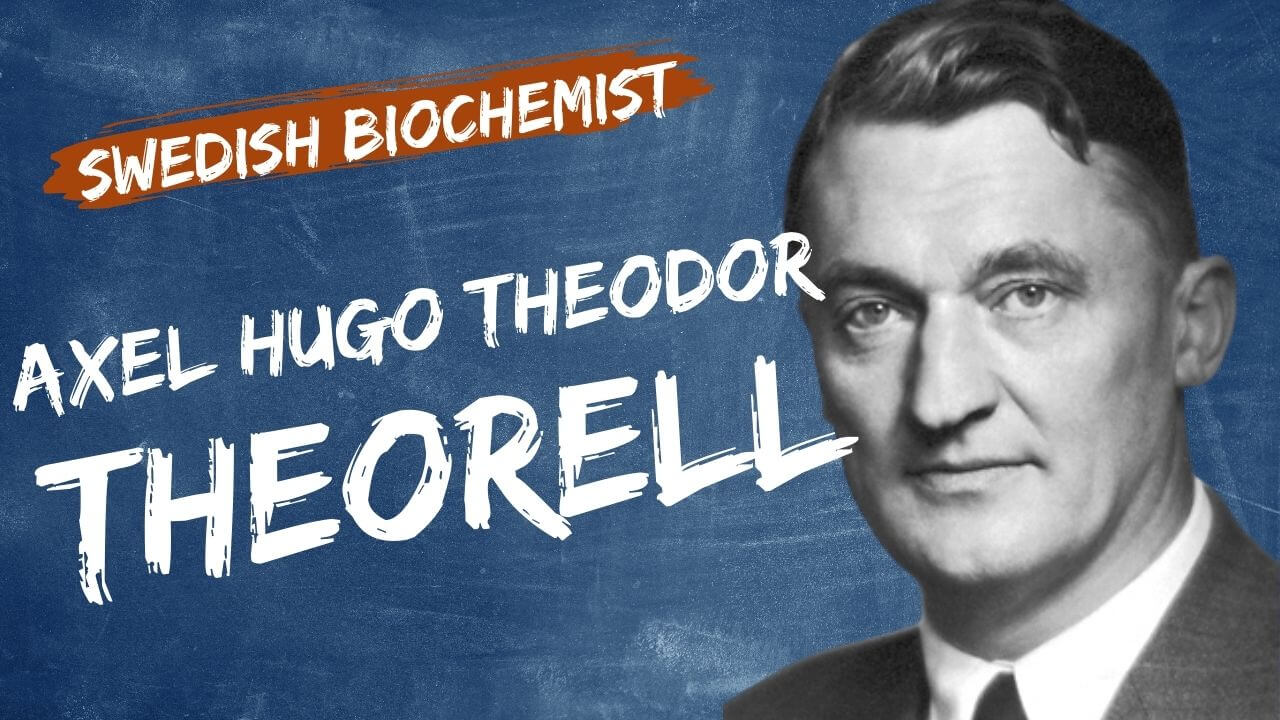Who was Axel Hugo Theodor Theorell? Explore the remarkable life and groundbreaking contributions of Axel Hugo Theodor Theorell, Nobel laureate in Physiology or Medicine (1955). From his early years to the yellow enzyme discovery, delve into the legacy of a visionary biochemist.

Axel Hugo Theodor Theorell;(1903-1982), Swedish biochemist, who was awarded the 1955 Nobel Prize in physiology or medicine for his work on the enzymes that catalyze biological oxidations and reductions.
Theorell was born in Linkoping, Sweden, on July 6, 1903. He received his M. D. degree at the Karolinska Institutet in Stockholm in 1930. While still a student, he discovered and described the lipoproteins of blood plasma. In 1932—1933 he was assistant professor of biochemistry at Uppsala, where he worked on the ultracentrifuge with The Svedberg. During this period Theorell was the first to crystallize myoglobin, the protein responsible for the red color of muscle. He described many of the properties of myoglobin and also purified, crystallized, and studied other heme-containing proteins associated with cellular respiration, such as cytochrome C.
In 1934—1935, Theorell was associated with Otto Warburg in his institute in Berlin-Dahlem. While there, he worked on the “yellow enzyme” that several investigators had discovered in yeast, heart muscle, and milk. Theorell purified the enzyme by electrophoresis and separated it into two fragments by dialysis of an acidified solution. One fragment was a colorless protein. The yellow color was associated with a substance of low molecular weight, which Theorell identified as a monophosphate of riboflavin (vitamin B2). This substance, now known as FMN, or flavin-mono-nucleotide, was the first coenzyme clearly defined. Neither fragment showed enzyme activity by itself, but when Theorell recombined them, he obtained the yellow enzyme with its enzymatic activity fully restored.
In 1937, Theorell became director of a research institute at the Karolinska Institutet. He has continued his researches into the nature of enzyme systems.
Biography
Axel Hugo Theodor Theorell was a Swedish biochemist born on July 6, 1903, in Linköping, Sweden, and he passed away on August 15, 1982, in Stockholm, Sweden. He is renowned for his groundbreaking work in biochemistry, particularly his research on oxidation enzymes.
Here’s a brief overview of his biography:
- Early Life and Education: Axel Theorell studied at the Karolinska Institute in Stockholm, where he received his medical degree in 1926. He continued his studies in chemistry and biochemistry in Germany and Switzerland.
- Career and Research: Theorell’s significant contributions came in the field of enzymology. In the 1930s, he began investigating the nature and functions of enzymes, focusing on oxidation enzymes. His most notable achievement was the isolation and study of the yellow enzyme, which is crucial in the process of cellular respiration.
- Nobel Prize: In 1955, Axel Hugo Theorell was awarded the Nobel Prize in Physiology or Medicine for his discoveries related to the nature and action of oxidation enzymes. His work laid the foundation for understanding the biochemical mechanisms involved in cellular respiration.
- Later Career: Theorell continued his research and served in various academic and scientific roles. He was the head of the Nobel Institute for Biochemistry in Stockholm from 1947 to 1955.
- Legacy: Axel Hugo Theodor Theorell’s contributions to biochemistry significantly advanced the understanding of fundamental cellular processes. His work had a lasting impact on the field and paved the way for further research in enzymology.
Axel Theorell’s life and work are remembered as integral to the progress of biochemistry, and his legacy endures in the scientific community.